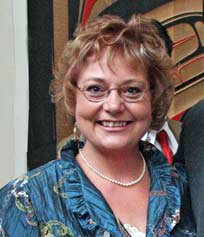Microsoft is a major sponsor for Education Nation, an NBC event promoting in-depth conversation about improving education in America. This is the third story in a series. Go
here
to read more in “The Education Community Speaks Out” Q&A series and for more information on Microsoft’s education efforts.
REDMOND, Wash. – Sept. 29, 2010 – With 330 children at all grade levels, Patricia Miller explains that her district is so rural, “We have fewer residents than we do square miles.” Miller and her schools have been involved with a number of Microsoft programs including Partners in Learning and the Innovative Education Forum. She has also been working with Microsoft on a pilot project to use Microsoft’s Zune in rural classrooms.

Patricia Miller, superintendent, Fort Sumner Municipal Schools, New Mexico.
You have a lot of insight into rural school districts, since you both work in one and grew up on a ranch in New Mexico. What do you think the rest of the country doesn’t understand about rural schools in the U.S.?
Miller: I don’t think people in an urban setting realize that in a small town, if something happens and you lose your school, then you lose your community. When you’re in a large town — and I had over 20 years in a large school district — there are many things that your family life can revolve around, like your church, your neighborhood, your extended family. In a community like Fort Sumner, even if it’s not a school activity, whatever is going to happen in the community usually happens at the school.
The other thing that I don’t think people realize is that since you know everybody, everybody is vested in your success. If you’re a child and you’re hanging out at the convenience store rather than going to school, the folks who work there see you; they pick up the phone, call the school, and say, “Hey, did you know that Suzy Jones is down at the convenience store?”
What do you think is really working in education today?
Miller: Most of the people who are involved in education are there today because they truly love children. That’s what I think is working best. It matters to me that we encourage the best and the brightest to be in the field, and I see that happening more and more. I see teaching becoming more of a respected vocation than it was when I started.
If you could invent a piece of technology that does anything you want it to for the classroom, what would it be?
Miller: It would be a cell phone, and it would have all the functionality of a computer. You would whip it out when you needed to type a paper, and this little keyboard would appear in front of you on your desk. It would also have a little projector and of course you would have complete access to the Internet at whatever level and speed you needed. You would be able to beam things from one person to another so that you could collaborate and share your files. And then if I wanted to read books I could make my screen be whatever size I wanted it. Yeah, I want one of those.
Describe one of your favorite days from this summer.
Miller: I had submitted a grant application to get $500,000 to be able to put in a new heating/cooling system. Our school is heated by a boiler and cooled by a really old cranky swamp cooler, so I really needed this money. So that day I found out I was able to get that half a million dollars in competitive stimulus money, which means that I will be able to heat and cool that building using geothermal energy. That made me feel really good, and that same day my husband purchased me some aerobars for my road bike, and that makes me a better triathlete. So there you go, that was my great day. Half a million dollars and new aerobars for my bike.
Is there a teacher who inspired you growing up?
Miller: When I lived in New Jersey I had a sixth-grade teacher who genuinely cared about the children in her class. During that year my mother committed suicide. So my brother and I went to New Mexico to live with our grandparents. This teacher continued for years to send me letters and postcards and let me know that she still cared about me as an individual. I just remember how much she cared about me as a human being.
If you’ve done any research about what makes success for kids who are struggling with generational poverty, it always comes down to the relationships. And I think it’s part of the reason I find working in a rural community so rewarding. It’s always going to be about the relationships that I’m able to build with the teachers, students and parents. It all happens one child at a time, one parent at a time, one telephone call at a time. And I know it’s true because it worked for me.




